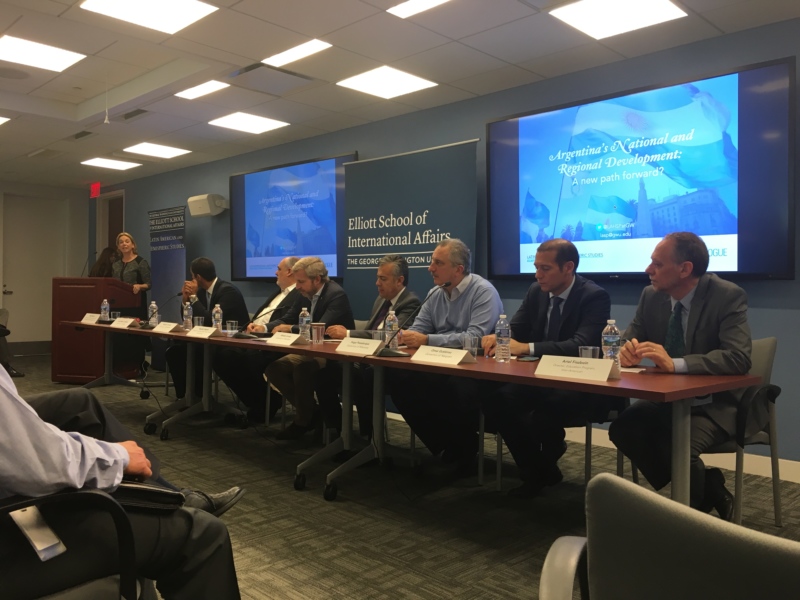Protecting Latin America’s Poor During Economic Crises
History tells us that economic crises cause large increases in poverty. The most recent economic crisis will cause Latin America’s GDP to contract around 2 percent in 2009.
On February 23rd the Latin American & Hemispheric Studies Program from the Elliott School of International Affairs at the George Washington University, together with The Dialogue, hosted an event on Argentina’s National and Regional Development. In the event, Rogelio Frigerio, Minister of Internal Affairs in Argentina; Juan Manuel Urtubey, Governor of Salta; Ricardo Colombí, Governor of Corrientes; Hugo Passalacqua, Governor of Misiones; Alfredo Cornejo, Governor of Mendoza; and Omar Gutiérrez, Governor of Neuquén discussed the new administration’s challenges and prospects for development. The event was moderated by Paula Alonso, director of the Latin American and Hemispheric Studies Program at GWU and closed by Ariel Fiszbein, director of the Education Program at The Dialogue.
Frigerio highlighted the interest in prioritizing the problems of the citizens over the interests of the parties. Before, he stated, governments saw the future up to the next election. The new administration is “changing the horizon from working for the next election to working for the next generation”. Additionally, Frigerio underscored the challenges behind the complex demands of its citizens. Argentinians want the country to be more competitive while continuing with protectionism, for the government to decrease its deficit and promote investment while increasing public spending and decreasing taxes. He expressed the need to improve Argentina’s competitiveness and open the economy.
The minister emphasized that a priority is to solve the high levels of poverty and inequality. “50% of Argentinians do not have access to sewer systems, 7 million do not have access to clean water, and 5 million do not have access to gas”. Argentina suffers from great levels of structural poverty, he added. Frigerio underlined the need to face these issues “gradually”. He also stressed how the administration’s coalition is facing an unprecedented challenge by having minorities in congress and senate; a challenge that has forced them to obtain “consensus in order to pass policies through dialogue and discussion”. He added that this consensus consolidates their policies. Frigerio explained the administration’s efforts to activate the economy and improve infrastructure. Finally, the intention is to unite Argentina’s “fragmented society” by strengthening institutions and promoting cooperation. “We hope that we can finally accomplish dreams that have been postponed for so long”.
Frigerio and the governors stressed the current progress on cooperation, not only between the parties, but also between the national government and the provincial governments to achieve sustainable development and a competitive Argentina. They also highlighted the focus on promoting integration. Urtubey stressed the importance of Argentina’s current moment: “for the first time we have the opportunity to show ourselves that our institutional system, in the way it is designed, is ideal to fix our people’s problems”. Urtubey also underscored the need to accelerate the country’s development process: at the current speed “it will take us 124 years to obtain average levels of development”. “Argentina is taking on the challenge to start processes that will take on longer than two administrative terms”, he added. Gutiérrez emphasized the important role of the private sector in the future of Argentina and the need for investment, especially in the energy sector: “investment generates production and jobs”. “Economic development is linked to institutional and democratic development”. Cornejo made reference to the future legislative elections: “this electoral year, government plans will either be ratified or rectified”.
In sum, regional development is the key for Argentina’s future. The new administration has developed long-term plans to eliminate poverty and inequality in Argentina. The priority is to generate efficient and sustainable programs by strengthening institutions, promoting dialogue and integration with provincial governments, and focusing on quality.
History tells us that economic crises cause large increases in poverty. The most recent economic crisis will cause Latin America’s GDP to contract around 2 percent in 2009.
Haiti represents one of the most complex and deeply rooted challenges facing U.S. foreign policy in the Western Hemisphere: a failing state on the doorstep of the world’s most powerful nation.
Since achieving independence in 1804 to become the world’s first free black state, Haiti has been beset by turbulent, often violent, politics and a gradual but seemingly unstoppable slide from austerity to poverty to misery.
 Inter-American Dialogue / Laura Campiglia Diaz
Inter-American Dialogue / Laura Campiglia Diaz